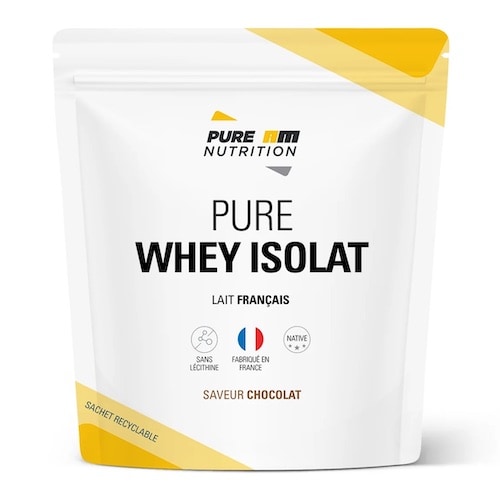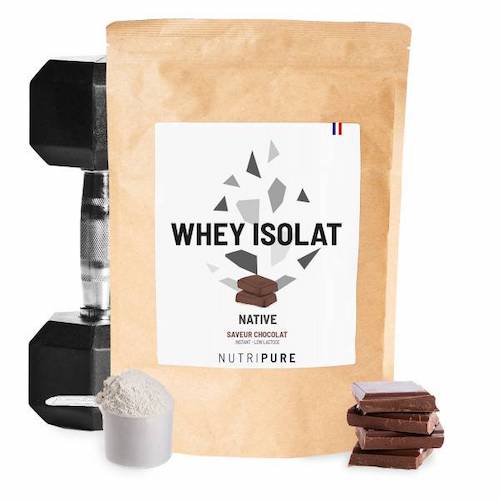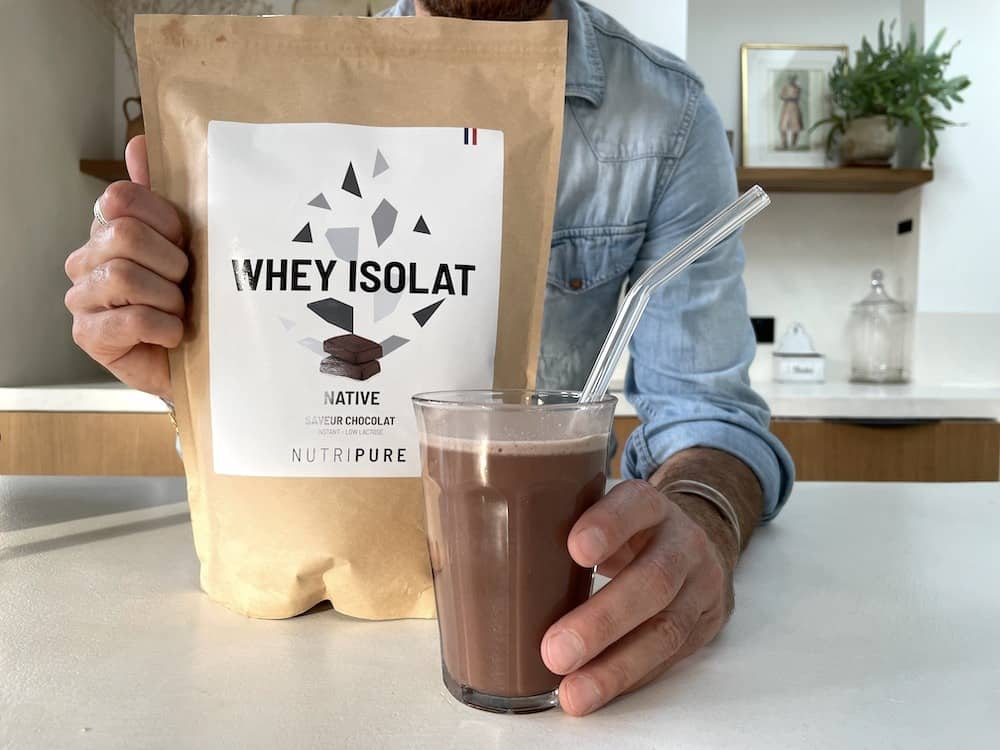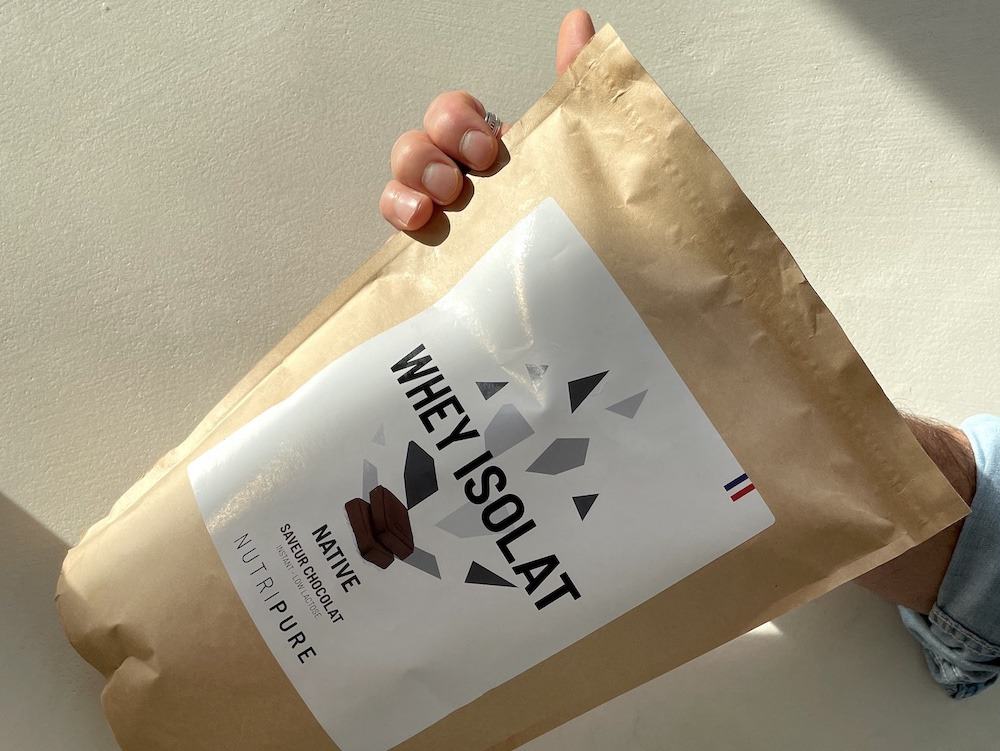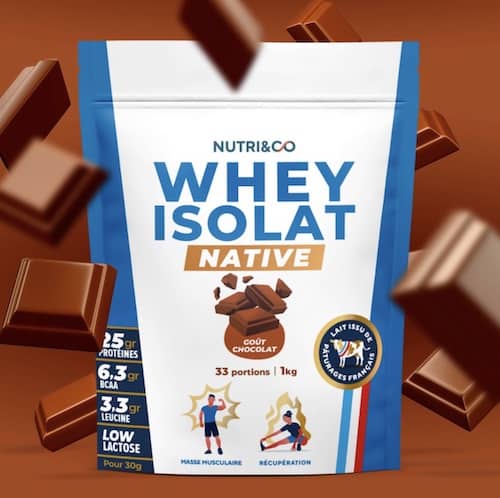Meilleure protéine whey 2025 : l’avis d’un diététicien (12 marques)
What are the best whey proteins on the market? Maxime Messegué, dietitian nutritionist, has thoroughly analyzed 12 brands based on 6 quality criteria to create this benchmark comparison. Quickly discover the top 3 whey proteins to maximize your muscle gain and weight loss goals.
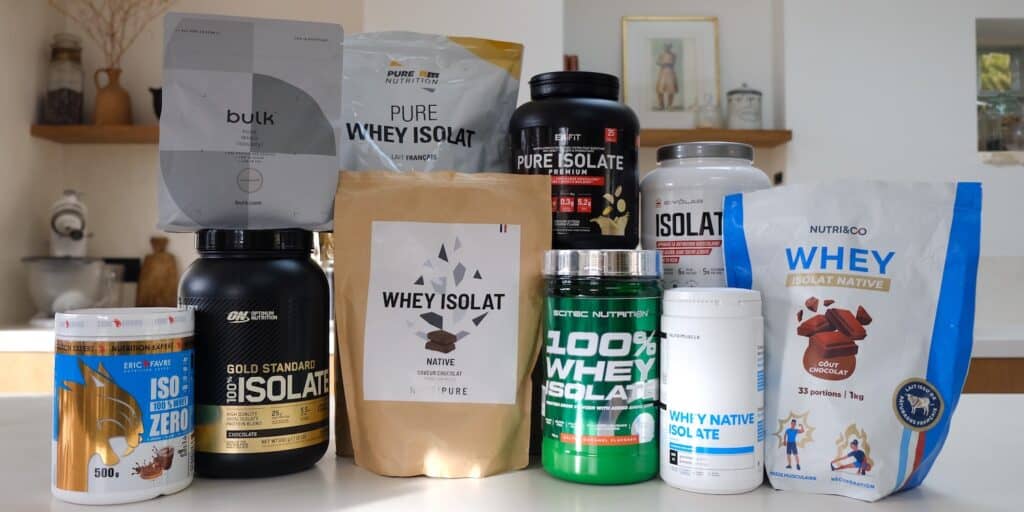
An editorial team specializing in nutrition. Authors of the book Beneficial Foods (Mango Editions) and the podcast Food Revolutions.
MY SELECTION
#1: Best Value for Money 🥇
> PURE Whey Isolate Native – AM Nutrition
#2: Best Premium Whey
> Whey Isolate Native – Nutripure
Whey comes from the dairy industry, originating from milk serum, or whey. Milk serum is obtained during the coagulation of milk in the cheese-making process.
This whey primarily contains lactose and small, soluble proteins rich in essential amino acids. Its biological value (the degree of assimilation and quality of amino acids) ranges from 104 to 114, making it one of the best proteins.
This explains why athletes have adopted it to meet their protein needs and to increase their muscle mass.
{{{TEMP_MARK_{{{TEMP_MARK_184}}}}}}To clarify, I tested and compared 12 of the most sold wheys online, rated them using 6 criteria, and then selected the top 3 products.
Tested brands: AMFIT, BiotechUSA, Bulk, EAfit, Eiyolab, Foodspring, NU3, Nutri&Co, Nutripure, Optimum Nutrition, Pure AM nutrition, Scitec Nutrition.
We evaluate all dietary supplements independently. If you click on one of the provided links, we may receive a commission without affecting the price or ranking.
My 6 Selection Criteria
To create this comparison, I established 6 qualitative criteria based on product characteristics and my testing of each of the 12 whey proteins.
{{{TEMP_MARK_{{{TEMP_MARK_176}}}}}}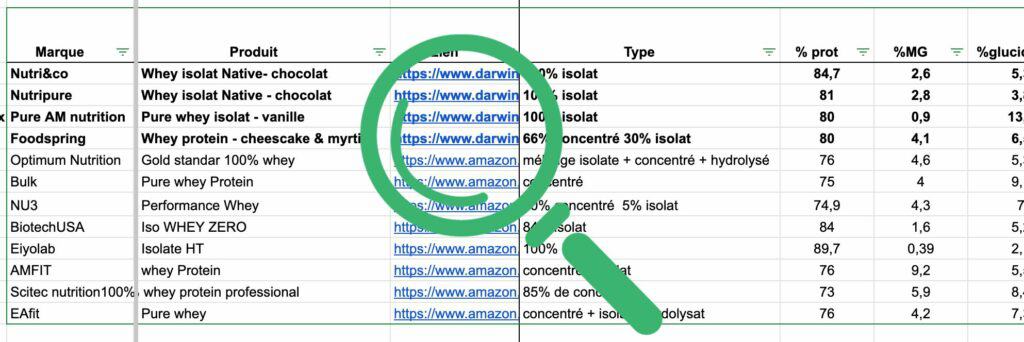
→ Access my complete comparative table here (Google Sheet)
1. Nutritional Value
To evaluate the nutritional value of whey, I relied on the protein content on one hand, and the amount of BCAA on the other.
Whey proteins with less protein content have more fats and carbohydrates, thus their rating is lower. The richer the whey in BCAA, the more effective it is for muscle building.
2. Safety
To rate the safety of different wheys, I based it on 4 sub-criteria:
- The origin of the milk used and how the cows are fed. Thus, pasture-raised or grass-fed cows produce better quality milk than those from intensive farming.
- Whether it is native quality or not. When Whey is native, the filtration is done cold, which helps retain the full integrity of the proteins.
- The number of additives and texturing agents. Most texturing agents used are not controversial, but their presence in large quantities isn’t ideal for the body. On a daily basis, it’s best to consume products with the shortest possible ingredient list.
- The sweeteners used. There are three: sucralose, acesulfame K, and steviol glycoside. The first two are controversial, while steviol glycoside seems so far to be harmless.
3. Brand Reputation
{{{TEMP_MARK_38}}}I also considered the Instagram community as well as the reviews found on Amazon and review sites like Trustpilot or Verified Reviews.
4. Solubility
A whey that mixes well and doesn’t clump is pleasant to consume. Therefore, I tested the solubility of the 10 brands by mixing 30 g of whey with 250 ml of water in a shaker. The same mixing time of 10 seconds was applied for each whey.
5. Taste
This part is more subjective, so I based it on my personal tastes!
I evaluated:
- The texture, favoring creamy textures
- The intensity of the sweet taste, favoring less sweet wheys. {{{TEMP_MARK_84}}}
6. Packaging Durability
Because waste reduction concerns us all, I also evaluated the type of packaging used, favoring brands that limit the use of plastic.
Best Whey: My Opinion
#1: BEST VALUE FOR MONEY 🥇
AM Nutrition: 4.3/5
Nutrition : ★★★★☆
Sécurité : ★★★★☆
Marque : ★★★★☆
Solubilité : ★★★★☆
Goût : ★★★★★
Pack : ★★★☆☆
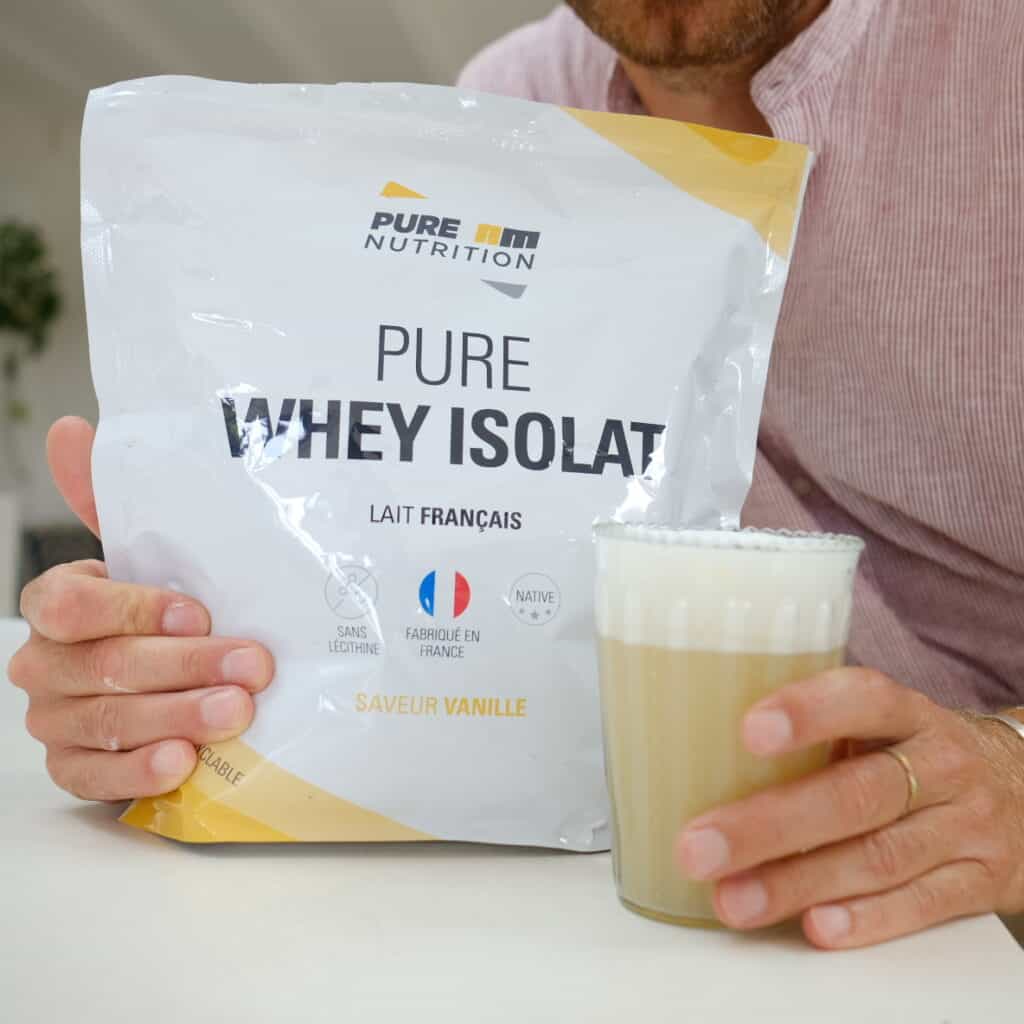

PURE AM Nutrition is a French brand created in 2017, specializing in dietary supplements for athletes. Its mission is to offer quality products with a simple composition at unbeatable prices.
{{{TEMP_MARK_44}}} {{{TEMP_MARK_25}}}AM Nutrition whey is native, not derived from a by-product of the cheese industry but directly from milk, so it is of superior quality as no heat treatment is applied for protein extraction. The milk used is French.
It is the only whey in our test to contain no additives or texturing agents. This is a very good thing! Its sweet taste is provided by a blend of sweeteners: steviol glycosides (natural) and sucralose (chemical and sometimes controversial).
I tested AM Nutrition vanilla flavor whey. I liked its pleasant and just sweet enough taste. I was less of a fan of the rather liquid texture with a foamy surface and a few lumps. This texture likely results from the absence of texturing agents in the formula.
This native whey isolate is sold at a very reasonable price given its premium quality and formulation. Its price is €42.71 per kilo.
For me, it is the whey with the best value for money.
#2: BEST PREMIUM WHEY
Nutripure: 4.7/5
Nutrition : ★★★★★
Sécurité : ★★★★★
Marque : ★★★★☆
Solubilité : ★★★★★
Goût : ★★★★☆
Pack : ★★★★★
Nutripure Native Whey Isolate cocoa flavor contains 81 g of protein per 100 g with 17.9 g of BCAA per 100 g. It also contains 2.8 g of fat and 3.8 g of carbohydrates. The carbohydrates are provided by the presence of low-fat cocoa and not by lactose, as it contains less than 0.2% lactose.
This whey is native, made from fresh French pasture milk. The proteins are isolated by cold micro-filtration. They remain intact and are not denatured by heat treatment.
Nutripure avoids all controversial substances for flavor; the brand uses natural flavors and a single natural sweetener, steviol glycoside. Derived from stevia, this sweetener is the safest on the market.
The powder mixes very well, it does not clump, and its taste is truly good. The cocoa content in the product adds a gourmet touch without an artificial aftertaste.
I really appreciate the simple and streamlined packaging from Nutripure, which uses an aluminum pouch covered with kraft paper. There is a real effort to minimize waste as much as possible.
{{{TEMP_MARK_39}}}#3: BEST ALTERNATIVE
Nutri&Co: 4.7/5
Nutrition : ★★★★★
Sécurité : ★★★★★
Marque : ★★★★☆
Solubilité : ★★★★★
Goût : ★★★★★
Pack : ★★★★☆

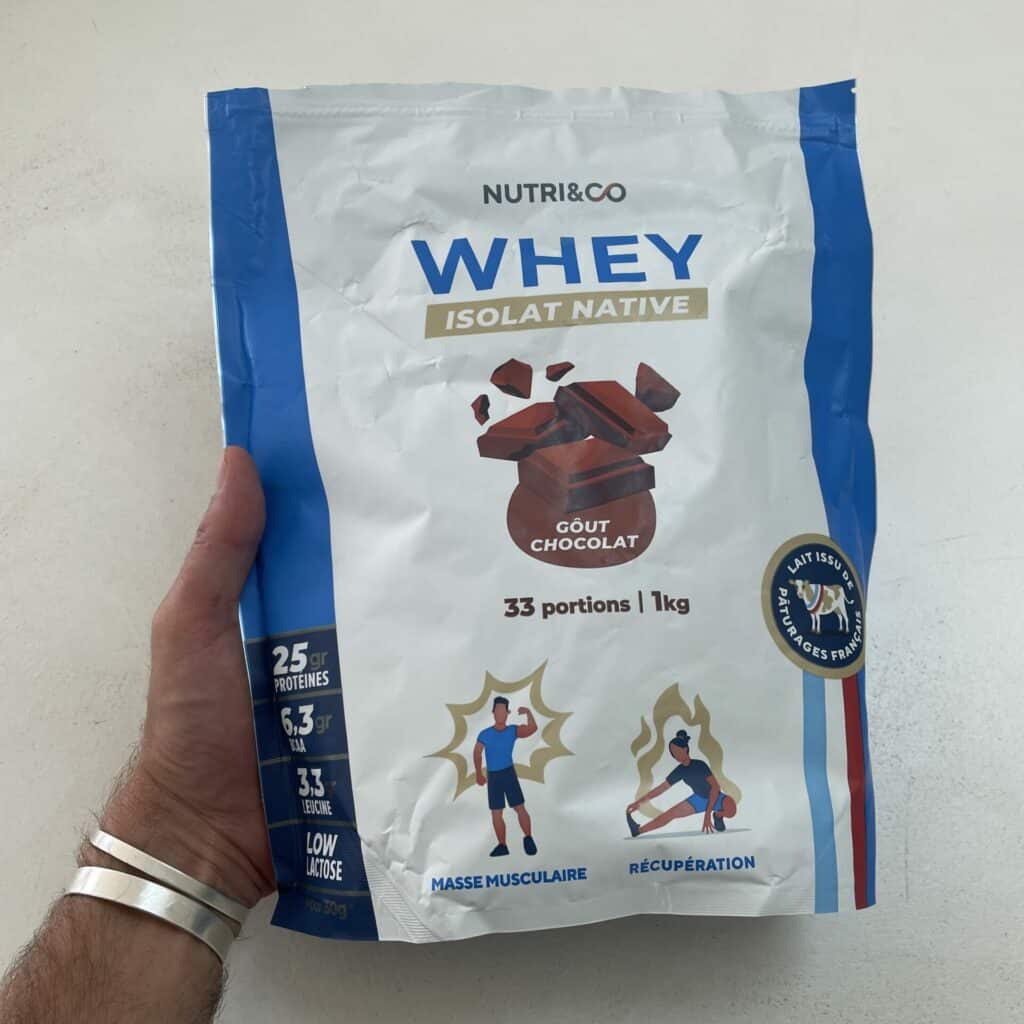
Nutri&Co is a French brand created in 2017. It specializes in selling dietary supplements aimed at improving health, beauty, and sports performance. Its goal is to provide the best possible quality with simple formulas and no controversial ingredients, at a fair price.
Nutri&Co’s chocolate-flavored isolate and native whey contains 85 g of protein per 100 g with 24.8 g of BCAA. This composition is very rare for whey, indicating exceptional milk quality.
Nutri&Co’s whey is native, which means it doesn’t come from the whey of the cheese industry but from milk directly. The proteins are extracted cold by micro-filtration, which preserves their quality.
{{{TEMP_MARK_76}}}Nutri&Co’s whey contains only 2 additives: xanthan gum and sunflower lecithin. They are not controversial.
The brand has chosen not to use chemical sweeteners. For the sweet flavor, only steviol glycoside (from stevia) is used.
The powder mixes well and does not clump, and its chocolate taste is pleasant, without a chemical aftertaste. The only downside is that I find it unfortunate that the packaging is plastic and not paper.
This whey is among the most expensive on the market at 49.90€ per kg, but quality has its price.
Complete Comparison
| Rating | Price/kg | {{{TEMP_MARK_1{{{TEMP_MARK_175}}}}}} | |
|---|---|---|---|
| Best quality/price ratio 🥇 > AM Nutrition – PURE Whey Isolate | 4.3 | 43 | 80 |
| Best premium whey > Nutripure – Whey Isolate Native | 4.7 | {{{TEMP_MARK_173}}} | 81 |
| Best premium alternative > Nutri&Co – Whey Isolate Native | 4.7 | {{{TEMP_MARK_175}}} | {{{TEMP_MARK_176}}} |
| 4. Foodspring – Whey protein | 4.3 | 44 | 80 |
| {{{TEMP_MARK_125}}} | 4.0 | 39 | 76 |
| {{{TEMP_MARK_138}}} | 3.8 | 38 | 75 |
| 7. NU3 – Performance Whey | 3.8 | 25 | {{{TEMP_MARK_1{{{TEMP_MARK_173}}}}}} |
| 8. BiotechUSA – Iso WHEY ZERO | 3.8 | {{{TEMP_MARK_184}}} | 84 |
| {{{TEMP_MARK_144}}} | 3.7 | 47 | 89.7 |
| {{{TEMP_MARK_143}}} | 3.7 | 26 | 76 |
| 11. Scitec Nutrition – 100% whey | 3.3 | {{{TEMP_MARK_184}}} | 73 |
| 12. EAfit – Pure whey | 3.2 | 39 | 76 |
→ Access my complete comparative table here (Google Sheet)
The different types of whey
Concentrated whey
Concentrated whey is the most used and sold whey. It mainly comes from the cheese industry.
During cheese production, the casein (solid proteins used in cheese-making) is separated from whey by high-temperature heat treatment. This treatment denatures part of the proteins. The whey is then dehydrated to give concentrated whey.
It contains about 80% protein, but also fats and lactose. It is relatively inexpensive.
Native whey
Native whey is a whey that does not come from the cheese industry; the whey is separated from the casein by cold filtration directly from the milk. There is no denaturation of the proteins.
{{{TEMP_MARK_80}}}Whey isolate
Whey isolate is a concentrated whey that has undergone additional filtration. It is free from most of its fats and lactose.
It is particularly interesting for people intolerant to lactose, or those wishing to bring in as few calories as possible.
{{{TEMP_MARK_75}}}It should be noted that a whey can be both native and isolate. This is the best quality on the market.
{{{TEMP_MARK_{{{TEMP_MARK_175}}}}}}Hydrolyzed whey
{{{TEMP_MARK_47}}} {{{TEMP_MARK_81}}}The proteins that make it up are therefore very quickly assimilated and very well tolerated. It is thus intended for people with digestive issues, or for athletes requiring an immediate protein intake.
Vegan whey
{{{TEMP_MARK_73}}}However, there are more and more plant-based protein powders available, suitable for vegetarian or vegan diets. These products usually contain a mix of several types of plant proteins derived generally from peas, rice, hemp, soy, etc.
📚 Read also | Comparison of the best plant-based protein powders
Frequently Asked Questions (FAQ)
What is whey used for?
Whey is a protein substitute that meets the increased needs during intensive sports practice. Its amino acid composition is very interesting, which makes it a quality choice for promoting good muscle growth.
Moreover, its proteins are small and rapidly assimilated, making them immediately available after physical activity. This optimizes recovery.
How much whey should be consumed per day?
The amount of whey you need will depend on various factors: your protein needs, the degree of your physical effort, your goals, and the amount of protein you bring into your daily diet.
However, a person looking to increase their protein intake may start with 30 g per day after a workout to promote muscle recovery.
How many times a day can you take whey?
This again depends on your protein consumption in your daily diet and your needs. It is impossible to generalize.
For example, a person who consumes a lot of meat products will not have the same needs as someone who eats very little.
Where can you buy whey?
Whey can be purchased in stores specializing in fitness but also in some major sports stores. It is also found in some pharmacies.
For this test, we purchased the whey on Amazon or directly from the brands via their online store.
When to take whey?
Ideally, it is preferable to take whey outside of meals, after sports practice. It is also possible to consume it during a meal to enhance protein intake.
Whey or casein?
Whey, or serum, comes from the whey. It consists of the milk’s soluble proteins. These proteins are small, very digestible, and quickly assimilated, which is very useful for quickly providing the muscles with the proteins they need.
Casein comes from the solid part found in dairy products (yogurt, cottage cheese, skyr, fromage blanc, etc.). Caseins are large proteins that take longer to be digested by the body. They are sometimes poorly tolerated.
The use is not the same as whey: casein is generally used in the evening to complement whey, providing proteins overnight, which prevents muscle catabolism.
Casein is recommended only for certain sports practices, such as bodybuilding with high protein needs.
Whey or BCAA?
If whey is of good quality, it contains a good amount of BCAA.
BCAAs are branched-chain amino acids that assist in muscle building and recovery. There are three of them: valine, leucine, and isoleucine. They are called essential amino acids because the body cannot synthesize them on its own. They must therefore be obtained through diet.
Without them, muscle building is impossible, and other amino acids will not be properly utilized.
Taking BCAAs in capsule form before a workout can be useful to limit muscle catabolism during intense sessions. However, there is no need to add them to whey if it is of good quality.
📚 Read also | Comparison of the Best BCAAs
Whey or creatine?
Creatine is an amino acid derivative that is naturally present in the body, mainly in muscle fibers and the brain. It is synthesized by the kidneys, liver, and pancreas from three amino acids: arginine, glycine, and methionine.
Creatine acts as an energy precursor for muscles, enhancing athletic performance, particularly in strength and bodybuilding sports.
It has nothing to do with whey, which aids in recovery and muscle growth.
📚 Read also | What is the best creatine on the market?
Does whey help in weight loss?
No, whey is not designed for weight loss but to facilitate muscle mass growth. However, developing muscle mass increases your basal metabolism. In this context, whey can indirectly aid in fat loss, as long as the body is in a caloric deficit.
Are there any risks or contraindications to consuming whey?
If there is no excess and whey meets the body’s natural protein needs, there is no danger in consuming it.
For it to be beneficial and not harmful, whey consumption should be combined with a varied and balanced diet.
Caution: People with kidney failure need to monitor their protein intake. In such cases, it is recommended not to consume whey without medical advice.
Is whey indispensable for muscle gain?
No, whey is absolutely not indispensable for muscle gain! It is entirely possible to do without it by being attentive to protein intake from traditional foods.
Whey is a convenient and economical boost to meet protein needs, but it is not essential.
Summary of my selection
{{{TEMP_MARK_43}}}# Best premium whey
> Whey Isolate Native – Nutripure
# Best premium alternative
> Whey Isolate Native – Nutri&Co

